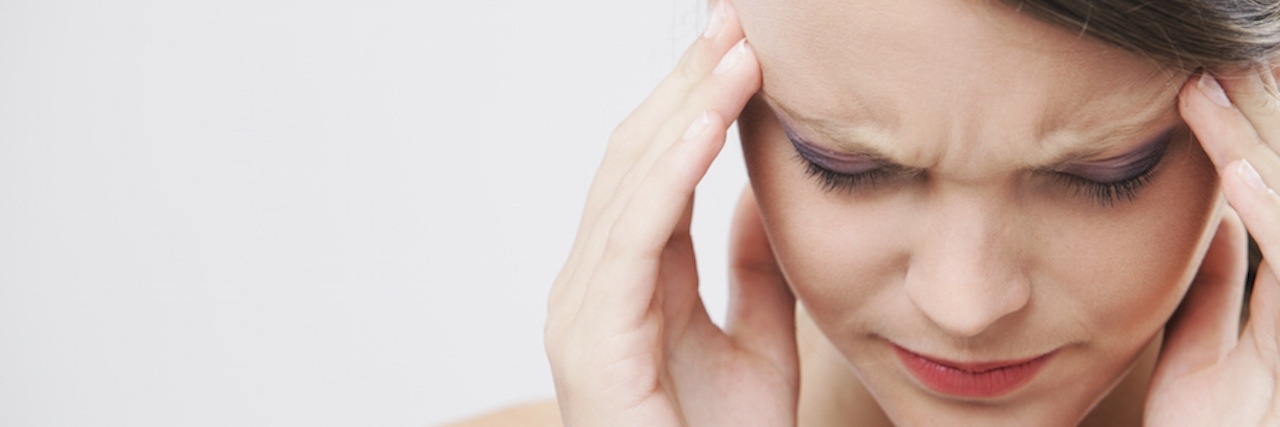Until I entered the world of chronic illness, I never thought of myself as someone who had a problem with depression.
I know, those of you who know I used to self-harm and had a suicide attempt are probably thinking, “What?“
But I always considered those things to be natural reactions to situations…to childhood abuse; to an abusive marriage; to a sexual assault; to too much stress/an unhappy relationship/a breakup/etc. You get the idea.
I never thought of mentioning that to doctors who asked if I had a history of depression before prescribing a medication, which in retrospect was pretty dumb — especially when I was given a migraine preventive that ended in my then 15-year-old son sitting up with me all night to make sure I wouldn’t hurt myself.
And I still thought nothing of it. It was just the medication, I told myself.
Two years later, I knew I was depressed. Very, very depressed. But who wouldn’t be, living in daily pain? Of course I was depressed about it…but that was because I was sick, right?
And yes, depression with chronic illness is normal. Very normal. In fact, people with chronic pain have significantly higher prevalence of depression than the general population.
I’d promised my sisters I’d never hurt them like that again after my suicide attempt at 19. I had kids and grandkids to hang on for. I had people who cared.
But what I didn’t have was hope. And living in that gray world was becoming harder and harder. I’d like to say I was scared of the places my thoughts went, but I wasn’t. I was too far down the rabbit hole to care. I cared about my loved ones, but not myself. I wanted to die, even hoped I would, so I could escape the pain but still keep my promises.
And still, I didn’t think I was not OK. It was normal. It became my new normal.
Thank God my general practitioner saw it almost a year ago when I went in to ask for a referral to a specialist. He saw what I didn’t myself — that I couldn’t find my way out of the rabbit hole. That I needed help badly, and that I couldn’t ask for it because I didn’t know how lost I was.
He didn’t suggest my depression wasn’t entirely because of my chronic pain, just that I try something to help. And wonder of wonders (because it can be hard to find the right medication, I learned through years of my kids fighting mental illness — it can literally take years of trial and error), it did help. Within a few weeks, even.
And only then, looking back, did I see just how far down the rabbit hole I was, and it was terrifying. Completely and utterly. And it scared me to realize how familiar that darkness was — to realize it was familiar because I’d been there before. This had just been a longer stay. To realize that dark rabbit hole has always been here, and how easy it was and would be to fall back in — not in a leap, but in tiny increments, slipping a little more…a little more…and to not notice until it was too late.
And that while I’m cool with my dark side, I don’t want to always live there. I need sunlight, too. Not only do I need it, I need to reach for it and hold it — for myself, not for others, even the ones I love. I need to do it for me.
It’ll be a year in April that I’ve been being treated for depressive disorder. It doesn’t stop me from having bad days. It doesn’t turn me into a ray of sunshine and happiness. It doesn’t change that I hate being sick all the time and that I mourn the life I lost. It doesn’t necessarily even give me hope for the future or for now.
What it does is help my thoughts and moods so I can find hope and the other side of the rabbit hole myself. It helps stabilize me so I can stay my course, wherever it may go. It helps me realize that even though I’ve made friends with my demons, I can’t always trust them.
I’ve learned to mostly keep an eye out for the rabbit hole, even to explore it a bit. To recognize when I’m balancing on the edge of it, or at the least when I’m in it. To try to climb out on my own. I’m working on recognizing when I need to ask for someone to lend me a hand or toss me a lifeline.
It’s not a magic fix any more than getting glasses will fix bad eyesight — the problem is still there. But it does help me see it better and bring it into the right perspective.
And I can see now it’s still a beautiful life, and I’m holding on to it for all it’s worth.
If you or someone you know needs help, see our suicide prevention resources.
If you need support right now, call the Suicide Prevention Lifeline at 1-800-273-8255.

